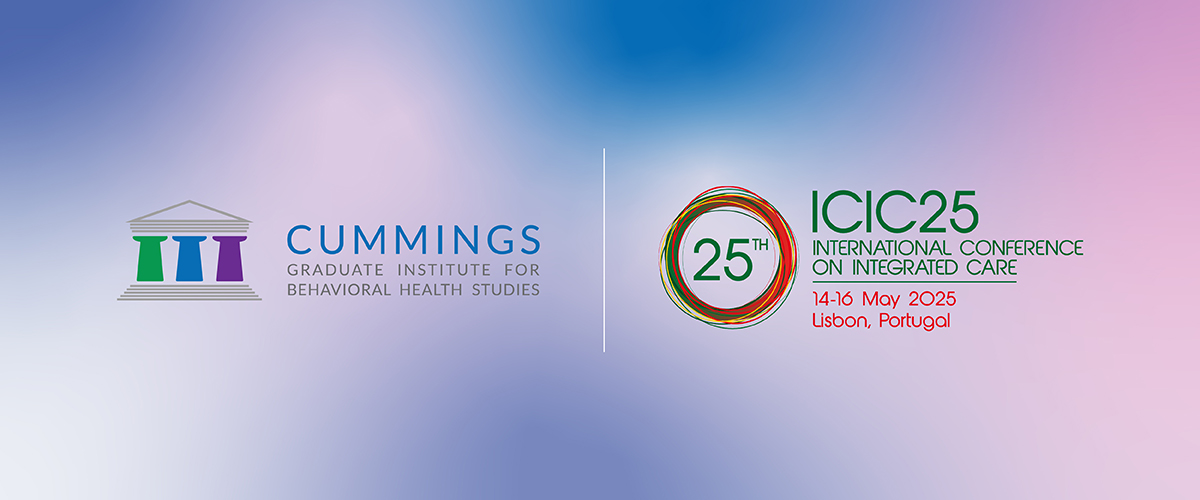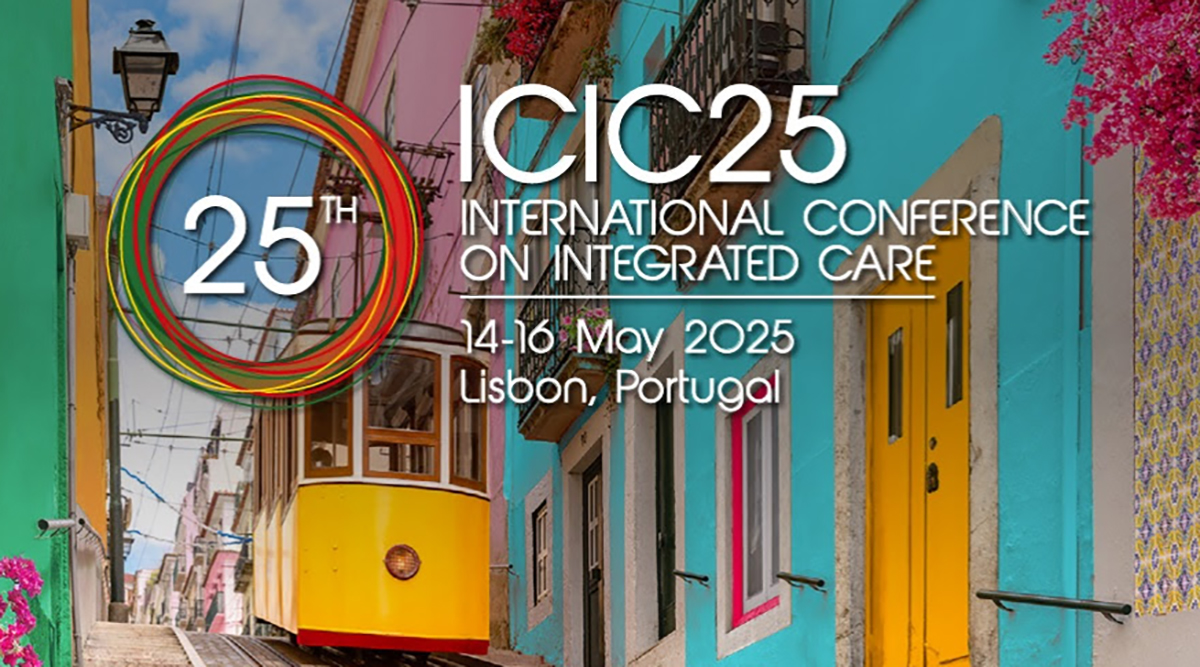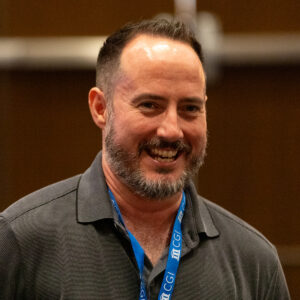CGI Experts to Present at ICIC25 in Lisbon, Portugal: Advancing Integrated Care on the Global Stage
Cummings Graduate Institute for Behavioral Health Studies is proud to announce that several members of the Cummings CGI DBH community will be presenting at the 25th International Conference on Integrated Care (ICIC25), taking place May 14–16, 2025, in Lisbon, Portugal. Hosted by the International Foundation for Integrated Care (IFIC) in collaboration with a distinguished group of partners, ICIC25 brings together international leaders, researchers, healthcare providers, policymakers, and patients to explore this year’s theme: “Synergising Health and Care: Leveraging Integrated Care for a Sustainable Future.”
CGI is honored to contribute to this global dialogue, showcasing the work and research of its faculty and students who are actively shaping the future of integrated behavioral health. Their presentations and posters reflect CGI’s mission to train leaders who are equipped to address complex healthcare challenges through innovative, evidence-based, and person-centered approaches.
Introducing the CGI community members presenting at ICIC25:
Dr. Cara English, DBH, MA, LAC
Chief Executive Officer and Chief Academic Officer
Workshop: Re-invigorating the Global Network for Integrated Care Education and Training
Thursday, May 15, 2025, 1:45 PM – 2:45 PM
Background:
Education and training in integrated care have been the focus of many presentations at previous events, and the subject of recent publications related to the need for globally-aligned competencies for the integrated care workforce. IFIC’s Education and Training SIG was founded in 2017 with an aim to build a global network of researchers and educators focused on best practices for workforce development in integrated care. During the pandemic, that SIG became inactive; however, many of its members continued their work either independently or in collaboration with SIG colleagues. A recent study led by the IFIC Academy team focused on identifying the state of education and training in integrated care across seven countries. The findings from that study and other recent publications on this topic will be discussed in this workshop, which has been designed to re-invigorate the SIG on Education and Training by building upon findings, attracting new partners who wish to engage in this movement, and identifying next steps for this group as we respond to the global workforce crisis. When we discuss workforce training and education in this context, we will include formal education (beginning with undergraduate education curriculum) through graduate degrees and beyond into continuing education and professional development for health and social care providers in the workplace, as well as education and development for caregivers and patient/person self-management of care in communities. The importance of involving people, patients, and carers in developing, designing, delivering, and evaluating curriculum will be a theme interwoven throughout this workshop.
Learning Outcomes:
After group discussions, key takeaways from group discussions will be summarized in the large group, and notes will be captured as the large group plans the next steps to continue this work after the conference. Information and follow up opportunities will be provided in closing remarks and notes on the workshop will be shared with participants.
Dr. Ellen Fink-Samnick, DBH, MSW, LCSW, ACSW, CCM, CCTP, CRP
Faculty Associate & Academic Advisor
Presentation: Tackling Medical Gaslighting in Integrated Care: Employing Ethics and Equity Through Education and Advocacy
Thursday, May 15, 2025, 8:00 AM – 9:00 AM
Background:
Medical gaslighting is the latest health equity opportunity for integrated care professionals. Shared stories from patients and caregivers include experiences of being dismissed and devalued by providers. Minoritized and marginalized individuals are at highest risk for the negative impact of this experience; particularly older adults, persons of color, women, the LGBTQIA++ community, and persons with visible and invisible disabilities. Ethical principles intersect with education and training gaps, health equity imperatives, and a serious need to evaluate the culture of health and social service delivery. Addressing Medical Gaslighting by democratizing care planning, delivery, and evaluation is a global population health mandate. To reduce the economic, clinical, and emotional burden of this barrier, communities and health systems must learn how to build cultures of psychological safety and inclusion for all partners in the integrated care process.
This interactive hybrid presentation and panel discussion will blend research with lived patient, caregiver, and professional experiences that highlight medical gaslighting. Attendees will explore the Ethical Equity Advocacy Roadmap as a strategy that can be used by any attendee to identify, intervene, and interrupt medical gaslighting through advocacy, education, and training at any level.
Learning Outcomes:
At the end of this session, attendees will be able to:
- Define medical gaslighting and understand patient, caregiver, and practitioner experiences
- Identify the impact medical gaslighting has on all partners, formal and informal, in integrated care
- Implement effective strategies to address medical gaslighting in any practice setting or community
Nikole R Jiggetts, LCSW, RPT-S, CTP
DBH Student
Poster: Rooting Resilience: Cultivating Mental Health and Physical Health to Safeguard Kidney Function.
Chronic Kidney Disease (CKD) affects one in seven U.S. adults, with depression present in 20% of early-stage cases. Racial and ethnic disparities are pronounced, with Black and Latinx populations disproportionately affected and often diagnosed at later stages. This poster explores the comorbidity of CKD and depression, highlighting how socioeconomic factors like food insecurity and limited healthcare access contribute to worsened outcomes. Research shows depression in CKD patients is linked to higher hospitalization and cardiovascular risks, while antidepressant efficacy remains unclear, especially among minority groups. The findings advocate for integrated care models that incorporate routine depression screenings and account for social determinants of health to improve outcomes and reduce disparities in CKD treatment.
Joel Matiella, M.Ed., BCBA, LBA
DBH Student
Poster: ABA in Psychiatric Hospitals: Training for Effective and Ethical Practices
This poster highlights the need for improved support for individuals with autism spectrum disorder (ASD) in inpatient psychiatric settings. It outlines how traditional methods like physical restraints and forced medical compliance can be harmful, leading to feelings of abuse among patients and burnout among staff. The author presents applied behavior analysis (ABA) as an evidence-based alternative that promotes ethical, effective care and encourages specialized training for hospital nurses and staff.
To explore the full ICIC25 program—featuring over 400 oral presentations across 85 themed sessions, 60 Rapid Fire talks, and 40 hands-on workshops—visit the official agenda.
With more than 1,000 delegates already registered, ICIC25 will be an inspiring environment for learning, networking, and global collaboration in integrated care. Registration is still open—don’t miss the opportunity to join our CGI experts in Lisbon and witness firsthand the impactful work of CGI faculty and students.
Note:
- Patients and caregivers may receive no-cost conference registration (travel and accommodation not included). Email niamhdalyday@integratedcarefoundation.org for more information on how to apply.
- Use code KNOWLEDGE to receive a 10% discount.
We’re incredibly proud of our CGI experts presenting on the international stage, and we celebrate their dedication to transforming healthcare through integrated care. Congratulations!




































